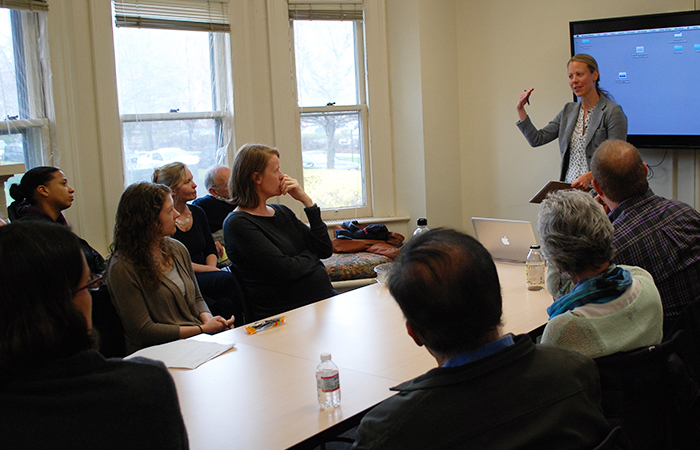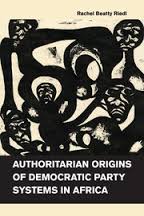Faculty Spotlight: Rachel Beatty Riedl
IPR political scientist studies African politics through a comparative lens
Get all our news
When I see thousands of people going to a religious revival meeting or stopping to pray in the streets because it’s Friday at noon and the call to prayer has started, I see the potential for political mobilization.”
Rachel Beatty Riedl
Associate professor of political scientist, a faculty affiliate at the Buffett Institute for Global Studies, and an IPR fellow

IPR political scientist Rachel Beatty Riedl discusses a research experiment on religious messaging in Nairobi, Kenya.
Beginning in the late 1980s, pro-democracy forces across Africa toppled some of the continent’s authoritarian regimes in favor of more democratic systems. As recently as October 2014, protestors in Burkina Faso ousted then-President Blaise Compaoré, who had sought to amend the country’s constitution to extend his 27 years in office.
Arriving in the West African nation just months after the political upheaval, IPR political scientist Rachel Beatty Riedl, an expert in democratic transitions on the continent, met with members of Compaoré’s outgoing party, budding opposition parties, and civil society activists.
Organized by the nonprofit Carter Center, which was created by former President Jimmy Carter and his wife Rosalynn, the trip brought in experts such as Riedl to encourage a peaceful transition. It also allowed her a “fascinating” vantage point from which to experience a democratic transition in action.
“Providing information to key actors at these incredibly important moments of transition is crucial to shaping the system going forward,” Riedl said.
From Authoritarian Regimes to Democratic Systems
Today, nearly two dozen African countries maintain varying forms of democratic competition, while many others do not. Riedl capitalized on this variation in her book, Authoritarian Origins of Democratic Party Systems in Africa (Cambridge University Press, 2014) to “look at countries that went through fairly similar historical transitions and then understand how they unfolded differently,” she said.

Her field research in Ghana, Senegal, Zambia, and Benin showed that differences in democratic party systems could be traced back to the authoritarian regimes that preceded them: In countries where authoritarian leaders had developed wide social support before the transition, party systems became more institutionalized, as incumbent parties were able to exert greater influence during the transition. On the other hand, party systems in countries where authoritarian incumbents had less support before the transition became less institutionalized, leading to more open participation.
As in the case of Burkina Faso, these “critical moments of transition” provide “a lot of room for shaping the potential for stability and representation in the future,” Riedl explained.
Religion and Politics: Sub-Saharan Africa and Beyond
While conducting field research for her first book, Riedl found herself “struck by the social salience” of religion in the countries she studied.
“When I see thousands of people going to a religious revival meeting or stopping to pray in the streets because it’s Friday at noon and the call to prayer has started, I see the potential for political mobilization,” she said.
She began by surveying local religious and political leaders in Ghana, Kenya, Uganda, and Tanzania, uncovering differences in political engagement between, and within, religious denominations. In particular, the project focuses on Pentecostalism—the fastest-growing Christian sect in Africa.
Last summer, Riedl and her team carried out randomized visits to 100 Pentecostal churches in Nairobi, Kenya, interviewing local religious leaders and analyzing the religious messages at each church.
Recognizing Pentecostalism’s strong emphasis on the individual, Riedl and co-author Gwyneth McClendon of Harvard University have identified how messages of empowerment and positive personal potential at the organizational level lead to greater individual political participation. They are conducting a series of experiments to test how the religious messages conveyed by Pentecostal churches affect political engagement and policy preferences surrounding inequality and redistribution at the individual level, research that could have far-reaching implications.
“The context is specific, but the direct link between religious messages and potential individual responses is a global question,” Riedl noted.
Decentralization and Local Governance in Africa
Another current project stems from a 2008 World Bank report on “Local Governance and Community Development in Africa,” in which Riedl was asked to participate because of her skill in comparative analysis. For the report, she collaborated with other experts to identify how changes in decentralization led to changes in outcomes such as service provision, accountability, and political participation in countries across Africa.
Now, she is using the same World Bank data to conduct research on how political party systems affect whether significant decision-making authority and autonomy are transferred to the local level. Her results point to an interesting finding—authoritarian regimes might have the capacity and incentives to implement decentralization, while more fragmented, democratic party systems might actually prevent it.
Like all of Riedl’s research, the project takes a comparative, nuanced approach to looking at Africa, something that is often lost in contemporary portrayals of the continent.
“We tend to look at Africa and think about the stories of insecurity, violence, and conflict that generally get reported in the news,” she explained. “People know less about the ways in which democratic institutions are functioning well in certain countries.”
Rachel Beatty Riedl is associate professor of political scientist, a faculty affiliate at the Buffett Institute for Global Studies, and an IPR fellow.
Published: June 23, 2016.